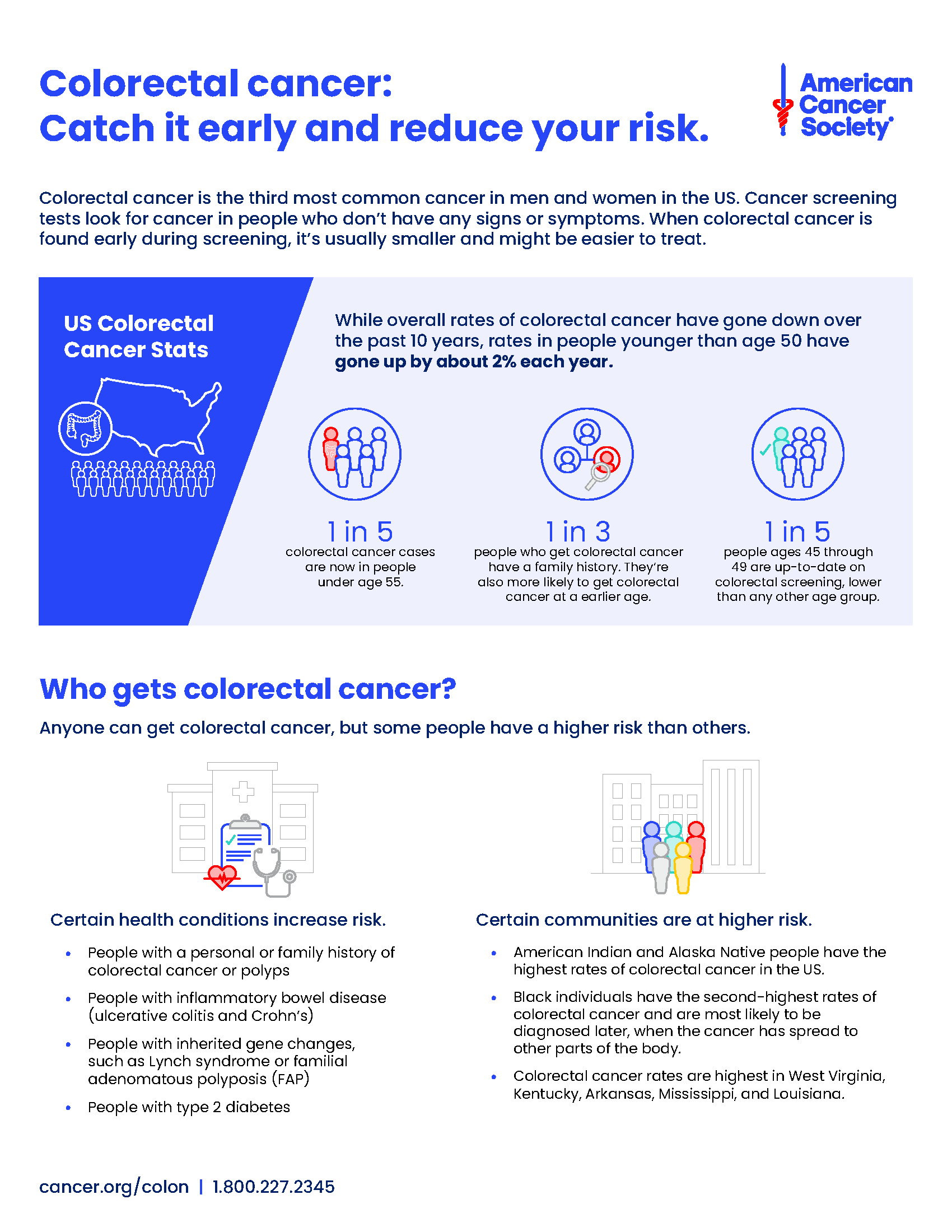Infographic: Colorectal Cancer: Catching It Early
Colorectal cancer is one of the most common types of cancer and is a leading cause of cancer-related deaths in the United States. If all adults 45 and older were screened for colorectal cancer we could avoid thousands of deaths each year and prevent many people from ever getting the disease.
This infographic focuses on the benefits of getting tested, identifying the people at greatest risk for developing colorectal cancer, and the steps you can take to detect colorectal cancer early or even prevent it altogether.
- Infographic
- Text Alternative


Colorectal cancer is the third most common cancer in both men and women in the US. Cancer screening tests look for cancer in people who don't have any signs or symptoms. When colorectal cancer is found early during screening, it's usually smaller and might be easier to treat.
US Colorectal Cancer Stats
While overall rates of colorectal cancer have gone down over the past 10 years, rates in people younger than age 50 have gone up by about 2 percent each year.
Who gets colorectal cancer?
Anyone can get colorectal cancer, but some people have a higher risk than others.
Certain health conditions increase risk:
- People with a personal or family history of colorectal cancer or polyps
- People with inflammatory bowel disease (ulcerative colitis and Crohn’s)
- People with inherited gene changes, such as Lynch syndrome or familial adenomatous polyposis (FAP)
- People with type 2 diabetes
Certain communities are at higher risk:
- American Indian and Alaska Native people have the highest rates of colorectal cancer in the US.
- Black individuals have the second-highest rates of colorectal cancer and are most likely to be diagnosed later, when the cancer has spread to other parts of the body.
- Colorectal cancer rates are highest in West Virginia, Kentucky, Arkansas, Mississippi, and Louisiana.
Can colorectal cancer be prevented?
Everyone should start regular screening for colorectal cancer at age 45. If you’re at high risk of colorectal cancer based on family history or other factors, you may need to start screening before age 45, be screened more often,or get specific tests.
Stool-based tests
About stool-based tests:
- Can be done at home
- Low cost
- No bowel prep or sedation
- Need to be done more often than visual tests
- Will need a colonoscopy if test is abnormal
- Can miss many polyps and some cancers
Stool-based test options:
- Guaiac-based fecal occult blood test (gFOBT) every year or
- Fecal immunochemical Test (FIT) every year or
- Multi-targeted stool DNA test (MT-sDNA) every 3 years
Visual-exam tests
About visual-exam tests:
- Done in doctor’s office or health facility
- Bowel prep needed
- Only a colonoscopy can remove and test polyps
- Any test other than a colonoscopy will require a colonoscopy if the test is abnormal.
Visual exam test options:
- Colonoscopy every 10 years or
- CT colonography (virtual colonoscopy) every 5 years or
- Flexible sigmoidoscopy every 5 years
There are some differences between these tests to consider, but the most important thing is to get screened, no matter which test you choose.
More than half of all colorectal cancers are linked to physical inactivity, poor nutrition, excess body weight, tobacco, and alcohol.
- Eat more vegetables, fruits, and whole grains.
- Limit or avoid red and processed meats, sugary drinks,andrefinedgrains.
- Be as physically active as you can.
- Get to a healthy weight range.
- Don’t use tobacco, and avoid secondhand smoke.
- Limit or avoid alcohol.
© 2023, American Cancer Society, Inc.
No. 012793 Rev. 12/23
American Cancer Society Emails
Sign up to stay up-to-date with news, valuable information, and ways to get involved with the American Cancer Society.


